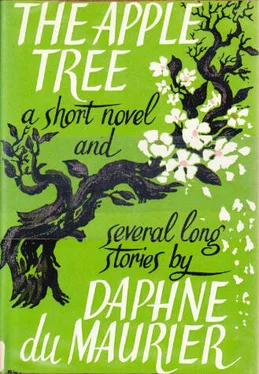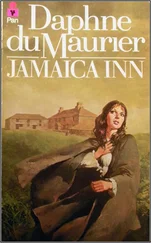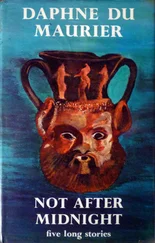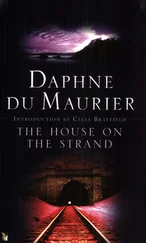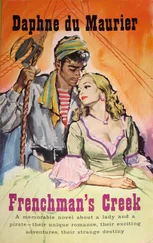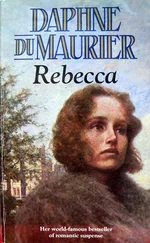Daphne du Maurier - The Apple Tree - a short novel & several long stories
Здесь есть возможность читать онлайн «Daphne du Maurier - The Apple Tree - a short novel & several long stories» весь текст электронной книги совершенно бесплатно (целиком полную версию без сокращений). В некоторых случаях можно слушать аудио, скачать через торрент в формате fb2 и присутствует краткое содержание. Жанр: Современная проза, Триллер, Социально-психологическая фантастика, на английском языке. Описание произведения, (предисловие) а так же отзывы посетителей доступны на портале библиотеки ЛибКат.
- Название:The Apple Tree: a short novel & several long stories
- Автор:
- Жанр:
- Год:неизвестен
- ISBN:нет данных
- Рейтинг книги:5 / 5. Голосов: 1
-
Избранное:Добавить в избранное
- Отзывы:
-
Ваша оценка:
- 100
- 1
- 2
- 3
- 4
- 5
The Apple Tree: a short novel & several long stories: краткое содержание, описание и аннотация
Предлагаем к чтению аннотацию, описание, краткое содержание или предисловие (зависит от того, что написал сам автор книги «The Apple Tree: a short novel & several long stories»). Если вы не нашли необходимую информацию о книге — напишите в комментариях, мы постараемся отыскать её.
The Apple Tree: a short novel & several long stories — читать онлайн бесплатно полную книгу (весь текст) целиком
Ниже представлен текст книги, разбитый по страницам. Система сохранения места последней прочитанной страницы, позволяет с удобством читать онлайн бесплатно книгу «The Apple Tree: a short novel & several long stories», без необходимости каждый раз заново искать на чём Вы остановились. Поставьте закладку, и сможете в любой момент перейти на страницу, на которой закончили чтение.
Интервал:
Закладка:
He knows me, she thought in wonder, he has seen me before, but even this was not so unexpected as the quality of his voice, not rough, not harsh, not the voice of someone in a cellar under a shop, but cultivated, liquid, a voice that matched the eyes of the gazelle.
"It was so hot up in the street," she said. "The shops were closed and I felt faint. I came down the steps. I am very sorry, it is private, of course."
The face disappeared from the window. He opened a door somewhere that she had not seen, and suddenly she found a chair beneath her and she was sitting down, inside the doorway, and it was dark and cool inside the room, even like the cellar she had imagined, and he was giving her water from an earthenware cup.
"Thank you," she said, "thank you very much." Looking up, she saw that he was watching her, with humility, with reverence, the pitcher of water in his hand; and he said to her in his soft, gentle voice, "Is there anything else I can get for you, Madame la Marquise?"
She shook her head, but within her stirred the feeling she knew so well, the sense of secret pleasure that came with admiration, and, conscious of herself for the first time since he had opened the window, she drew her scarf closer about her shoulders, the gesture deliberate, and she saw the gazelle eyes fall to the rose, tucked in the bodice of her dress.
She said, "How do you know who I am?"
He answered, "You came into my shop three days ago. You had your children with you. You bought a film for your camera."
She stared at him, puzzled. She remembered buying the film from the little shop that advertised Kodaks in the window, and she remembered too the ugly, shuffling, crippled woman who had served her behind the counter. The woman had walked with a limp, and afraid that the children would notice and laugh, and that she herself, from nervousness, would be betrayed to equally heartless laughter, she had ordered some things to be sent to the hotel, and then departed.
"My sister served you," he said, in explanation. "I saw you from the inner room. I do not often go behind the counter. I take photographs of people, of the countryside, and then they are sold to the visitors who come here in the summer."
"Yes," she said, "I see, I understand."
And she drank again from the earthenware cup, and drank too the adoration in his eyes.
"I have brought a film to be developed," she said. "I have it here in my bag. Would you do that for me?"
"Of course, Madame la Marquise," he said. "I will do anything for you, whatever you ask. Since that day you came into my shop I…" Then he stopped, a flush came over his face, and he looked away from her, deeply embarrassed.
The Marquise repressed a desire to laugh. It was quite absurd, his admiration. Yet, funny… it gave her a sense of power.
"Since I came into your shop, what?" she asked.
He looked at her again. " I have thought of nothing else, but nothing," he said to her, and with such intensity that it almost frightened her.
She smiled, she handed back the cup of water. "I am quite an ordinary woman," she said. "If you knew me better, I should disappoint you." How odd it is, she thought to herself, that I am so much mistress of this situation, I am not at all outraged or shocked. Here I am, in the cellar of a shop, talking to a photographer who has just expressed his admiration for me. It is really most amusing, and yet he, poor man, is in earnest, he really means what he says.
"Well," she said, "are you going to take my film?"
It was as though he could not drag his eyes away from her, and boldly she stared him out of face, so that his eyes fell and he flushed again.
"If you will go back the way you came," he said, "I will open up the shop for you." And now it was she who let her eyes linger upon him; the open vest, no shirt, the bare arms, the throat, the head of curling hair, and she said, "Why cannot I give you the film here?"
"It would not be correct, Madame la Marquise," he said to her.
She turned, laughing, and went back up the steps to the hot street. She stood on the pavement, she heard the rattle of the key in the door behind, she heard the door open. And then presently, in her own time, having deliberately stood outside to keep him waiting, she went into the shop which was stuffy now, and close, unlike the cool quiet cellar.
He was behind the counter and she saw, with disappointment, that he had put on his coat, a grey cheap coat worn by any man serving in a shop, and his shirt was much too stiff, and much too blue. He was ordinary, a shopkeeper, reaching across the counter for the film.
"When will you have them ready?" she said.
"Tomorrow," he answered, and once again he looked at her with his dumb brown eyes. And she forgot the common coat and the blue stiff shirt, and saw the vest under the coat, and the bare arms.
"If you are a photographer," she said, "why don't you come to the hotel and take some photographs of me and my children?"
"You would like me to do that?" he asked.
"Why not? " she answered.
A secret look came into his eyes and went again, and he bent below the counter, pretending to search for string. But she thought, smiling to herself, this is exciting to him, his hands are trembling; and for the same reason her heart beat faster than before.
"Very well, Madame la Marquise," he said, "I will come to the hotel at whatever time is convenient to you."
"The morning, perhaps, is best," she said, "at eleven o'clock."
Casually she strolled away. She did not even say goodbye.
She walked across the street, and looking for nothing in the window of a shop opposite she saw, through the glass, that he had come to the door of his own shop and was watching her. He had taken off his jacket and his shirt. The shop would be closed again, the siesta was not yet over. Then she noticed, for the first time, that he too was crippled, like his sister. His right foot was encased in a high fitted boot. Yet, curiously, the sight of this did not repel her, nor bring her to nervous laughter, as it had done before when she had seen the sister. His high boot had a fascination, strange, unknown.
The Marquise walked back to the hotel along the dusty road.
At eleven o'clock the next morning the concierge of the hotel sent up word that Monsieur Paul, the photographer, was below in the hall, and awaited the instructions of Madame la Marquise. The instructions were sent back that Madame la Marquise would be pleased if Monsieur Paul would go upstairs to the suite. Presently she heard the knock on the door, hesitant, timid.
"Entrez," she called, and standing, as she did, on the balcony, her arms around the two children, she made a tableau, ready set, for him to gaze upon.
Today she was dressed in silk shantung the colour of chartreuse, and her hair was not the little girl hair of yesterday, with the ribbon, but parted in the centre and drawn back to show her ears, with the gold clips upon them.
He stood in the entrance of the doorway, he did not move. The children, shy, gazed with wonder at the high boot, but they said nothing. Their mother had warned them not to mention it.
"These are my babies," said the Marquise. "And now you must tell us how to pose, and where you want us placed."
The children did not make their usual curtsey, as they did to guests. Their mother had told them it would not be necessary. Monsieur Paul was a photographer, from the shop in the little town.
"If it would be possible, Madame la Marquise," he said, "to have one pose just as you are standing now. It is quite beautiful. So very natural, so full of grace."
"Why, yes, if you like. Stand still, Hélène."
"Pardon. It will take a few moments to fix the camera."
His nervousness had gone. He was busy with the mechanical tricks of his trade. And as she watched him set up the tripod, fix the velvet cloth, make the adjustments to his camera, she noticed his hands, deft and efficient, and they were not the hands of an artisan, of a shop-keeper, but the hands of an artist.
Читать дальшеИнтервал:
Закладка:
Похожие книги на «The Apple Tree: a short novel & several long stories»
Представляем Вашему вниманию похожие книги на «The Apple Tree: a short novel & several long stories» списком для выбора. Мы отобрали схожую по названию и смыслу литературу в надежде предоставить читателям больше вариантов отыскать новые, интересные, ещё непрочитанные произведения.
Обсуждение, отзывы о книге «The Apple Tree: a short novel & several long stories» и просто собственные мнения читателей. Оставьте ваши комментарии, напишите, что Вы думаете о произведении, его смысле или главных героях. Укажите что конкретно понравилось, а что нет, и почему Вы так считаете.
